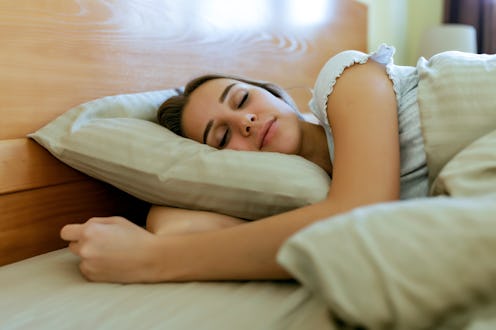Life
Experts Explain What Happens To Your Body In Sleep Paralysis

Waking up in the middle of the night and discovering, to your horror, that you can't move your arms or legs isn't that uncommon. It's known as sleep paralysis, and up to 8% of the population have experienced it at some point. Contrary to what you might think in that terrifying moment, you haven't been possessed by a ghost, cursed, or rendered permanently paralyzed. Experts tell Bustle that sleep paralysis happens because you've become conscious of the body's own self-protection mechanisms during deep sleep.
Sleep paralysis can occur at virtually any point in the night, sleep expert Dr. Michael Breus Ph.D. tells Bustle, particularly when you're falling asleep or when you're in the middle of deep rest. The paralysis itself isn't anything to worry about, he says; it's what happens to virtually everybody during rapid eye movement sleep, or REM. "During REM, the body goes into a state of paralysis known as REM atonia, when major muscle groups and most voluntary muscles are paralyzed," Dr. Breus tells Bustle. It's crucial for the body to freeze during this time, because REM is when a lot of dreaming happens, and if you aren't paralyzed, you might start running away from those zombies in real life— and that might mean you hurt yourself or those around you.
"Sleep scientists believe that sleep paralysis may occur when the transitions in and out of REM sleep and other sleep stages don’t go smoothly," Dr. Breus tells Bustle. You should be completely unaware of your paralysis during REM sleep; if you're conscious of it, your brain has woken you up by accident. Research published in The Journal Of Neuroscience in 2012 found that the brain uses neurotransmitters to completely immobilize the body during REM sleep, but your muscles should relax when you wake up. Current science says that sleep paralysis is a kind of "in-between" state: your body is exhibiting the signs of REM sleep, but your brain is partially awake. How we get into that state, and why it exists, is a mystery.
It's not known precisely what happens in the brain during sleep paralysis, but one symptom that often accompanies it — a feeling of intense dread — could give us a clue. Researchers in 2017 found that hallucinations of "ghostly intruders" or room invaders are pretty common in people with sleep paralysis; you'll lie immobile convinced that there's something in the room with you. They suggested in Frontiers In Human Neuroscience that this hallucination might take place because of malfunctions in the right parietal cortex, which usually provide us with a map of our own bodies. During sleep paralysis, they say, this part of the brain might get confused and "sense" a different body in the room alongside our own. There's no proof for this theory yet, but it's an interesting possibility.
Sleep paralysis can also negatively affect your sleep because if you're terrified, it's not easy to rest. "The fear reaction following sleep paralysis elevates our heart rate and gives us an injections of adrenaline," sleep psychologist Hope Bastine tells Bustle. "It may be difficult to fall back asleep or might result in fitful sleep, because of a high resting heart rate." Ideally, your heart rate for restful sleep should be around 60-100 beats per minute, but if it's pounding madly, you'll risk having much less refreshing rest.
Many different factors can increase your risk of sleep paralysis. Bastine points to genetics, stress, jet lag, napping, or pulling all-nighters as possible ones. A study published in Journal Of Sleep Research in 2015 found that sleep paralysis is more common in people with a specific variant on the PER2 gene, which regulates our internal 24-hour clock. It's also influenced by your environment. People who've slept very badly, experienced trauma, exhaustion, fatigue, anxiety, or depression are all at higher risk of sleep paralysis. It's also more common in people who have narcolepsy, the sleep disorder that causes extreme fatigue and involuntary sleep during the day.
If sleep paralysis happens to you, it's important to try and put it in context, Dr. Breus tells Bustle. "Don't panic," he says. "Remind yourself that however frightening and disconcerting, it is temporary, harmless and will soon pass." He recommends keeping to a regular sleep routine, avoiding alcohol before bed, and paying attention to your mental health to try and lower your risk of sleep paralysis. Bastine says you can also try psychotherapy and stress management techniques to help you cope with any stressors that might be causing your paralysis at night. Rest assured that it's not a ghost in your room with you.
Studies cited:
Brooks, P. L., & Peever, J. H. (2008). Unraveling the mechanisms of REM sleep atonia. Sleep, 31(11), 1492–1497. doi:10.1093/sleep/31.11.1492
Denis, D., French, C. C., Rowe, R., Zavos, H. M., Nolan, P. M., Parsons, M. J., & Gregory, A. M. (2015). A twin and molecular genetics study of sleep paralysis and associated factors. Journal of sleep research, 24(4), 438–446. doi:10.1111/jsr.12282
Denis, D., French, C. C., & Gregory, A. M. (2018). A systematic review of variables associated with sleep paralysis. Sleep Medicine Reviews, 38, 141–157. doi: 10.1016/j.smrv.2017.05.005
Denis D. (2018). Relationships between sleep paralysis and sleep quality: current insights. Nature and science of sleep, 10, 355–367. doi:10.2147/NSS.S158600
Jalal, B., & Ramachandran, V. S. (2017). Sleep Paralysis, “The Ghostly Bedroom Intruder” and Out-of-Body Experiences: The Role of Mirror Neurons. Frontiers in Human Neuroscience, 11. doi: 10.3389/fnhum.2017.00092
Olunu, E., Kimo, R., Onigbinde, E. O., Akpanobong, M. U., Enang, I. E., Osanakpo, M., … John Fakoya, A. O. (2018). Sleep Paralysis, a Medical Condition with a Diverse Cultural Interpretation. International journal of applied & basic medical research, 8(3), 137–142. doi:10.4103/ijabmr.IJABMR_19_18
Expert:
Dr. Michael Breus, Ph.D.
Hope Bastine, M.Sc.
This article was originally published on